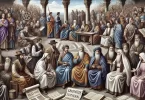Christmas, as I hope everybody (at least in the West) still knows is Jesus’ birthday. I don’t want to spend too much time here talking about how it is very unlikely that Jesus was born on December 25, and how this date was probably just chosen at some point in the late Ancient times/Early Medieval times to Christianize European pagans. The Bible never specifies when Jesus was born (although it does offer some hints), and so, some very devout Christians over history (Puritans, for example) thought that we should not even celebrate Christmas. The gospel according to John doesn’t even talk about Jesus’ birth. In it, Jesus simply appears as a grown man. The same thing happens in Mark’s gospel. Matthew and Luke give accounts of Jesus’ birth, with Luke being more detailed. So, ½ of our gospels don’t seem to be very interested in Jesus’ life before he was about 30 years old. Someone has said (and I think somewhat appropriately) that the gospels are accounts of Jesus passion (his death and resurrection) with long introductions.
But anyways! I don’t think that celebrating Christmas is bad, not at all! I believe it is a good occasion to remember Jesus, the founder of Western civilization. May we like it or not, the West is profoundly linked to Christianity. Christianism begin as little more than a small and persecuted Jewish sect, but eventually became the main religion in Europe (and northern Africa, and the Near East), and from there to the World. Some might say (and I think that sadly they might be right) that today Europe lives in a post-Christian era, but we should not forget that someday in the past to be European and to be Christian were basically synonyms. And I also believe that we, professing Christians or not, should be thankful to Christianity in a number of ways. I am very convinced that it was thanks to Christianity, especially after the Reformation, that we have many of the things that we, as liberty-lovers, are thankful for, such as science, capitalism and lots of individual liberty.
Of course, from the human perspective, the link between Christianism and West is merely accidental. I myself, as a Brazilian, am not sure if I classify as a Westerner. Maybe I am from the far West? It is very clear that for many decades now Christianism is moving to the global south: Latin America, Africa, Asia, and I hope not to be forgetting anyone. And I think that is just beautiful! I don’t believe that there is one essential Christian culture. Instead, I believe that culture is an essential human phenomenon and that Christianism can give a new birth to cultures, just as it does to individuals, bringing forward what they have best and leaving behind the bad stuff.
Sadly, the very places where Christianism is growing the most today are usually also the places where Christians suffer more persecution. Although we tend to connect the first few centuries of Christianism with martyrdom, with people being crucified, thrown to the beasts and the like, the fact is that the 20th century had more martyrs than any other century before. It is also sad for me that most people, including Christians and liberty-lovers, tend to ignore this. In the last few weeks, I heard of at least two churches being closed in China, with all members being taken to jail. I wish that people who care about freedom paid more attention to this. I also wish that people who care about Human Rights did the same. Some people are worried about gay couples not getting wedding cakes from Christian bakers, but they don’t seem to have the same concern about Chinese Christians being thrown in jail just because they are Christians.
Speaking of which, I want to be very honest and say that Marxism (or post-Marxism, or cultural Marxism) can easily become a religion. Marx is a prophet, The Capital is a holy book, the proletariat (or any oppressed minority, for the modern left) is both Messiah and holy people, a future communist utopia is Heaven. I believe that it was a Catholic apologist who said that “the problem with not believing in God is that we start to believe in any dumb thing – including in ourselves”. The problem with Marxism as a religion is the same problem I see with every other religion apart from Biblical Christianity: it is performance driven. It is about what you do. And as so, it can create a slippery slope in your heart. You become self-righteous and judgmental (in a bad way) of people outside your faith-group or even people inside your faith-group who you consider not holy enough. Of course, Christians are not exempt from this either, but I believe we have the right medicine for this.
As much as I believe that the New Left is one of the greatest problems in the West today and that several forms of totalitarianism are one of the main problems elsewhere, I don’t believe that libertarianism or conservatism are in themselves the solution. I became a libertarian (or a conservative-libertarian) because I am first a Christian. My first question was “what the Bible has to say about politics and economics”? I believe that somewhere in the libertarian camp we have the best answer for that. I believe the Bible teaches that very small and simple governments and market freedom are the answer. However, I would say that this is just partly the answer.
The way that I see it, the conflict between the left and the right is very much a conflict between Rousseau and Locke, or a conflict between two kinds of freedom. For Rousseau, you are only free when you are your true inner self. If necessary, the community can make an intervention to force you to become who you truly are. For Locke, you are free when you can make your own choices, regardless if they look good for others. As libertarians like to say, a crime without a victim is not a crime.
I believe this is also a basic conflict between modern western culture and more tradition culture – the conflict between collectivism and individualism. My answer as a Christian (and a libertarian) is that we should not force people to be Christians. That would, at best, produce external conformity – which is actually really bad. My understanding is that, as long as they are not predictably and wilfully hurting others, people should be let free to do whatever they want. And I do mean whatever. On the other hand, I don’t think that this is good – or as good as it can be. Ironically, I believe that Rousseau is onto something important: you are only truly free when you are who you are really supposed to be.
One great irony or paradox in Christianism is that you are only truly free when you are a slave to God. Understanding 1st-century slavery helps to get the analogy better. God bought us for a price. We belong to him. However, God is not satisfied with having us as slaves. Instead, he adopts us as sons. That is the (I believe) famous parable of the prodigal son: a son abandons his father and loses all his money. He comes back hoping to become a slave in his father’s house. His father takes him back as a son. So, Jesus gives us a new identity as sons of God. And I do mean sons, and not sons and daughters or children. In the 1st century daughters had no inheritance, but in Christ, we all share of it. So that is our true identity if we walk after Christ. And that is when we are truly free.
I don’t want to force anybody to be Christian. I believe that one of the greatest mistakes in Christian history was exactly that: to force people to become Christian. As I said, religion can easily create a slippery slope in the heart, and Christianism is not necessarily an exception. But while other religions are about what we do, Christianism in its essence has at least the potential to be what has been done for us. And that is truly humbling. And I believe this has important political implications: we pray for all. We hope for the best. We trust in God. We respect others.
So Merry Christmas to all! I hope that this is a time for remembering the birthday boy, and what he did, especially on the cross. And that we can all work for a world freer, where people can become Christians – if they choose so.
Source: https://notesonliberty.com/2018/12/26/merry-liberty-christmas/







